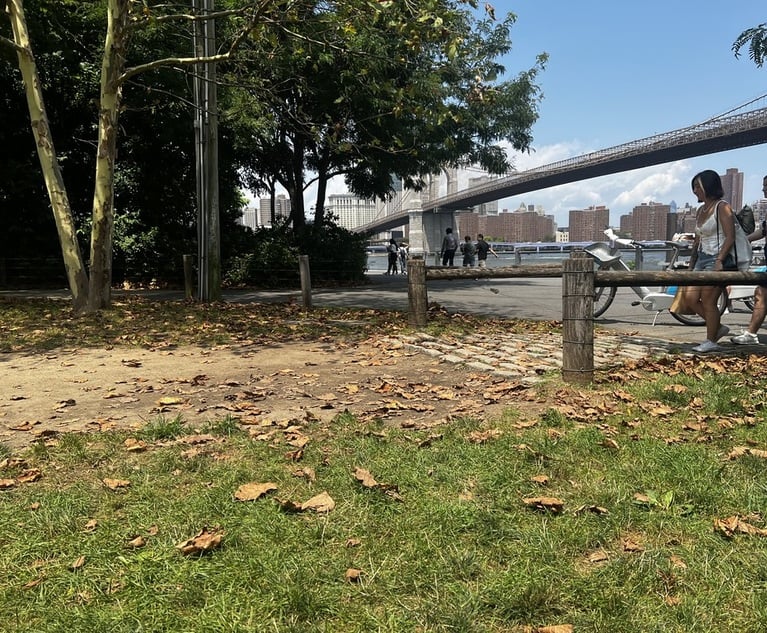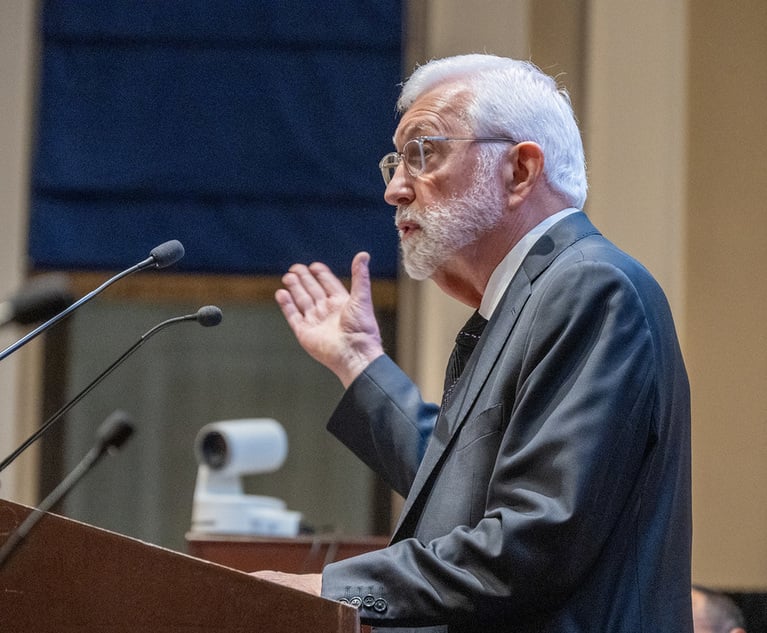 Appellate Division, First Department at 27 Madison Ave. (Photo by David Handschuh/NYLJ)
Appellate Division, First Department at 27 Madison Ave. (Photo by David Handschuh/NYLJ)Appeals Court, Citing Ethical Concerns, Overturns Ruling Over Law Firm's Legal Fees
The First Department panel said the allegations that the law firm violated ethical rules precluded a finding at this time that the firm was likely to succeed in its case for fees against a former client.
May 24, 2019 at 12:34 PM
4 minute read
A New York state appellate court has overturned a lower court's decision to give law firm Freeman Lewis an attachment against its former client for unpaid fees that could amount to $2 million, stating the lower court was too quick to set aside serious legal ethical concerns.
Freeman Lewis, a small firm with about three lawyers, has for years represented a failed Peruvian Pepsi bottler known by its Spanish initials, CEPSA. The firm has litigated on behalf of the bottler and affiliates for more than a decade to hold Pepsi liable for cutting off the company's business, racking up $600,000 in unpaid bills, according to court records.
The law firm sued its former clients for unpaid fees after learning that CEPSA's owners, members of the Heredia family in Peru, were inking a settlement with Pepsi that could result in the firm not getting paid.
Manhattan Supreme Court Justice Gerald Lebovits ruled last year that two members of the Heredia family and affiliated companies were “apparently” trying to settle in a way that would avoid paying Freeman Lewis what it was owed. The judge rejected the defendants' arguments that the law firm had violated an ethics rule by suing them while still formally being engaged to represent their interests, and ordered that up to $2 million could be restrained, an amount that includes interest and fees on the $600,000 in bills.
But the Appellate Division, First Department, set that decision aside on May 21.
“Whether some or all of plaintiff [Freeman Lewis]'s fee should be forfeited due to ethical violations is to be determined on a full record,” the panel wrote. “At this stage of the litigation, the allegations and arguments that plaintiff violated the Rules of Professional Conduct … preclude a finding that plaintiff is likely to succeed on the merits.”
The defendants argued that Freeman Lewis violated Rule 1.7 of the state legal ethics rules by suing CEPSA's holding company, called FIDEICOSA, while still being retained to represent its interests. Lebovits said the circumstances wouldn't raise concerns with a “reasonable attorney,” but the appellate court said the argument bore further consideration.
The First Department also noted that a clause in Freeman Lewis' retainer that “gave [it] a veto” over any potential settlement may have implicated Rule 1.2, which says lawyers must “abide by a client's decision whether to settle a matter.”
The appeals court also rejected the lower court's finding that two individuals and two companies “may be alter egos of FIDEICOSA” and could have their assets in New York attached, noting the companies observed corporate formalities and “did not use the corporate form to perpetuate a fraud or wrong upon the plaintiff.”
While the First Department panel upheld the decision below to reject the defendants' argument that the case required arbitration, the judges ultimately found that an attachment shouldn't have been ordered.
The panel included Justices John Sweeny, Dianne Renwick, Peter Tom, Barbara Kapnick and Jeffrey Oing.
Daniel Brown, a partner at Feuerstein Kulick who represented one of the Heredia family members on appeal, said his clients were “delighted with the Appellate Division's decision and order and will continue to vigorously defend themselves in this litigation.”
Patrick Bonner, a partner at Menz Bonner Komar & Koenigsberg who represents other members of the Heredia family and affiliated companies, couldn't be reached for comment.
Stephen Foreht of Foreht Associates, who represented Freeman Lewis, declined to comment.
This content has been archived. It is available through our partners, LexisNexis® and Bloomberg Law.
To view this content, please continue to their sites.
Not a Lexis Subscriber?
Subscribe Now
Not a Bloomberg Law Subscriber?
Subscribe Now
NOT FOR REPRINT
© 2024 ALM Global, LLC, All Rights Reserved. Request academic re-use from www.copyright.com. All other uses, submit a request to [email protected]. For more information visit Asset & Logo Licensing.
You Might Like
View All
Decision of the Day: Judge Denies Summary Judgment Motions in Suit by Runner Injured in Brooklyn Bridge Park

Decision of the Day: Administrative Court Finds Prevailing Wage Law Applies to Workers Who Cleaned NYC Subways During Pandemic


Decision of the Day: Second Amendment Does Not Offer Right to Obtain Firearms 'On Demand'
Trending Stories
Who Got The Work
Michael G. Bongiorno, Andrew Scott Dulberg and Elizabeth E. Driscoll from Wilmer Cutler Pickering Hale and Dorr have stepped in to represent Symbotic Inc., an A.I.-enabled technology platform that focuses on increasing supply chain efficiency, and other defendants in a pending shareholder derivative lawsuit. The case, filed Oct. 2 in Massachusetts District Court by the Brown Law Firm on behalf of Stephen Austen, accuses certain officers and directors of misleading investors in regard to Symbotic's potential for margin growth by failing to disclose that the company was not equipped to timely deploy its systems or manage expenses through project delays. The case, assigned to U.S. District Judge Nathaniel M. Gorton, is 1:24-cv-12522, Austen v. Cohen et al.
Who Got The Work
Edmund Polubinski and Marie Killmond of Davis Polk & Wardwell have entered appearances for data platform software development company MongoDB and other defendants in a pending shareholder derivative lawsuit. The action, filed Oct. 7 in New York Southern District Court by the Brown Law Firm, accuses the company's directors and/or officers of falsely expressing confidence in the company’s restructuring of its sales incentive plan and downplaying the severity of decreases in its upfront commitments. The case is 1:24-cv-07594, Roy v. Ittycheria et al.
Who Got The Work
Amy O. Bruchs and Kurt F. Ellison of Michael Best & Friedrich have entered appearances for Epic Systems Corp. in a pending employment discrimination lawsuit. The suit was filed Sept. 7 in Wisconsin Western District Court by Levine Eisberner LLC and Siri & Glimstad on behalf of a project manager who claims that he was wrongfully terminated after applying for a religious exemption to the defendant's COVID-19 vaccine mandate. The case, assigned to U.S. Magistrate Judge Anita Marie Boor, is 3:24-cv-00630, Secker, Nathan v. Epic Systems Corporation.
Who Got The Work
David X. Sullivan, Thomas J. Finn and Gregory A. Hall from McCarter & English have entered appearances for Sunrun Installation Services in a pending civil rights lawsuit. The complaint was filed Sept. 4 in Connecticut District Court by attorney Robert M. Berke on behalf of former employee George Edward Steins, who was arrested and charged with employing an unregistered home improvement salesperson. The complaint alleges that had Sunrun informed the Connecticut Department of Consumer Protection that the plaintiff's employment had ended in 2017 and that he no longer held Sunrun's home improvement contractor license, he would not have been hit with charges, which were dismissed in May 2024. The case, assigned to U.S. District Judge Jeffrey A. Meyer, is 3:24-cv-01423, Steins v. Sunrun, Inc. et al.
Who Got The Work
Greenberg Traurig shareholder Joshua L. Raskin has entered an appearance for boohoo.com UK Ltd. in a pending patent infringement lawsuit. The suit, filed Sept. 3 in Texas Eastern District Court by Rozier Hardt McDonough on behalf of Alto Dynamics, asserts five patents related to an online shopping platform. The case, assigned to U.S. District Judge Rodney Gilstrap, is 2:24-cv-00719, Alto Dynamics, LLC v. boohoo.com UK Limited.
Featured Firms
Law Offices of Gary Martin Hays & Associates, P.C.
(470) 294-1674
Law Offices of Mark E. Salomone
(857) 444-6468
Smith & Hassler
(713) 739-1250






